IRP’s Final Political and Ideological Collapse
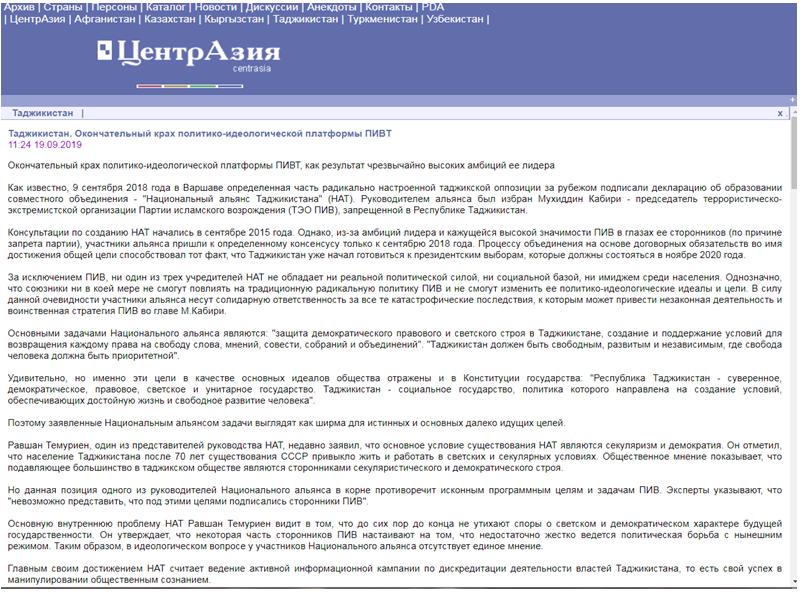
DUSHANBE, 19.09.2019 (NIAT Khovar) – As you know, on September 9, 2018 in Warsaw, a certain part of the radical Tajik opposition abroad signed a declaration on the formation of a joint association, — the National Alliance of Tajikistan (NAT). Muhiddin Kabiri, the chairman of the terrorist-extremist organization of the Islamic Renaissance Party (TEO IRP), banned in the Republic of Tajikistan, was elected the leader of the alliance.
Consultations on the creation of NAT began in September of 2015. However, due to the leader’s ambitions and the seemingly high importance of the IRP in the eyes of its supporters (due to the ban of the party), the alliance members reached a certain consensus only by September 2018. The process of unification on the basis of contractual obligations in the name of achieving a common goal was facilitated by the fact that Tajikistan had already begun to prepare for the presidential election, which will be held in November 2020.
Save for the IRP, none of the three founders of NAT possesses either real political strength, social base, or status among the population. It is clear that the allies in no way will be able to influence the traditional radical policy of the IRP and will not be able to change its political and ideological ideals and goals. By virtue of this evidence, the alliance members are jointly and severally liable for all those catastrophic consequences that may result from illegal activities and the belligerent IRP strategy led by M. Kabiri.
The main tasks of the National Alliance are: «protecting a democratic legal and secular system in Tajikistan, creating and maintaining conditions for returning to everyone the rights to freedom of speech, opinion, conscience, assembly and association […] Tajikistan should be free, developed and independent, where human freedom should be a priority.»
Surprisingly, these very goals, as the basic ideals of society, are also reflected in the Constitution of Tajikistan: “The Republic of Tajikistan shall be a sovereign, democratic, law-based, secular, and unitary state. Being a social oriented state Tajikistan shall provide relevant living conditions for every person.” Therefore, the tasks declared by the National Alliance look like a screen for true and basic far-reaching goals.
RavshanTemuriyon, one of the representatives of the NAT leadership, recently stated that secularism and democracy are the main condition for the existence of NAT. He noted that the population of Tajikistan, after USSR’s 70-year long existence, is used to living and working in secular conditions. Public opinion shows that the vast majority in Tajik society are supporters of the secular and democratic system.
But this position of one of the leaders of the National Alliance fundamentally contradicts the original program goals and objectives of the IRP. Experts point out that «it is impossible to imagine that supporters of the IRP subscribe to these goals.»
RavshanTemuriyon sees the main internal problem of NAT in the fact that disputes about the secular and democratic nature of future statehood still do not subside. He argues that some of the supporters of the IRP insist that the political struggle against the current regime is not tough enough. Thus, on an ideological issue, the participants in the National Alliance do not have a single opinion.
According to NAT, its main achievement is the conduct of an active information campaign to discredit the activities of the Tajik authorities, that is, its success in manipulating public consciousness.
The frankness of M. Kabiri clearly demonstrates that the focus on the overthrow of the constitutional order in the republic is the essential driving force of NAT.
It is no coincidence that the IRPT leader M. Kabiri, while expressing his sympathy for the Taliban movementseveral years ago, argued that the Taliban would push the Central Asian leadership towards greater democracy. The Taliban are not talking about democracy, they are talking about Sharia.
The founders of NAT repeat the same mistakes that were made by the Democratic Party of Tajikistan (DPT), the Rastokhez and LaliBadakhshon movements in the early 90s. Then these forces, believing in IRP, merged with it into a single association, thus losing their political and ideological independence. During the February events of 1990, the clergy and then the IRP joined other opposition political forces. Using the sincere feeling and sacred faith of the population in religion, using its powerful social base, in a very short timethe party ousted its political allies into the background, ignoring and suppressing at the most primitive level national-patriotic and democratic political views and thoughts in society. In the struggle for power in mid-1992, they initiated the start of a civil war in the country.
Temuriyon sees the main difference between NAT and the United Tajik Opposition (UTO) in that the political forces that make up NAT have no armed formations, while UTO had their own armed groups. Temuriyon emphasizes and argues that, for example, supporters of the DPT, led by MakhmadruziIskandarov, were better armed than others. Each DPT (Democratic Party of Tajikistan) fighter was equipped with 75 kilograms of American weapons. Obviously, under current conditions, with the available powerful Western patrons of the IRP and NAT, the acquiring arms will not be problematic.The IRP can source their arms from Afghanistan in a matter of days.
Based on the General Agreement Establishment of Peace and National Accord in Tajikistan, representatives of the UTO were allocated 30% of the quota of government posts at all levels of government. But the leaders of the IRP distributed the vast majority of these posts among the supporters of their party and deprived the DPT, the Rastokhez and LaliBadakhshon, which were full members of the UTO.
Starting January 18, 2019, Kabiri, as the chairman of NAT, regularly speaks on Facebook and answers questions from readers and viewers, the vast majority of whom disagree with the goals and ideology of the IRP, are dissatisfied with its activities and the personal position of Kabiri.
During his regular appearances, Kabiridevotes most of his time to advertising IRP and himself. He often ignores all references to NAT goals and program installations during the conversation and pursues the line of defense of his interests. The other three political forces, as minor related elements, are for him a symbolic screen for “legitimizing” the illegal activities of IRP. He claims that all his supporters know how to act now, and at the «X» hour will all receive additional instructions.
It follows from Kabiri’s statements that IRP supporters within the country behave like a secret society and are managed through social networks from abroad.
Noting that the head of the IRP Kabiri himself admits that in the early 90s in Astrakhan he was one of the youngest delegates to the congress on the creation of the Islamic Revival Party of the USSR, it becomes apparent that he had already felt that religion and political power are the most powerful tools and methods of personal enrichment and influence in society. Therefore (as one of the founders of the IRP in Tajikistan), Kabiri, along with other leaders of this party, is responsible for the tragic consequences of the activities of this party in the February events of 1990 in the city of Dushanbe, in the initiation of a civil war in mid-1992 and the attempted military attempt coup d’etat in September 2015.
Kabiri openly admits that at one time he received great financial and material assistance from Pakistan, the Islamic Republic of Iran and other Islamic states. Up to now, Kabirihas not opposed if Iran continues to provide financial assistance to the IRP, although the friendly relations between Iran and Tajikistan have been ruined because of it.
According to Kabiri, IRP’s main sources of financing are Tajik citizens, living within the country and abroad, including in Russia and the European Union. He claims that the source of funding for the IRP is not of particular importance to him. Apparently Kabiriis ready to accept financial assistance even from those who produce and sell drugs. Kabiri’s favorite phrase on the sidelines and in private conversations is: “IfAfghanistan will not grow narcotic plants, produce narcotic substances and sell them in other countries, then the people of Tajikistan and Uzbekistan will starve to death.”
After the closure of the IRP, many of its supporters openly appear in the media with regret that for many years they collected and sent significant financial resources to the party leadership, and do not know where and for what purposes their funds were used. They do not exclude that, perhaps, these huge sums of money have been used both in the personal interests of its leader and other party leaders. Now it becomes clear why Kabiri with such pride and enthusiasm talks about his regular trips to the Russian Federation from Kaliningrad to Vladivostok. The main purpose of these trips, it turns out, was to propagate radical religious ideas and raise money among Tajik labor migrants. It is no coincidence that our compatriots in the territory of Russia ended up in the ranks of ISIS in Syria and Iraq.
Kabiri loves to talk about his merits to the country, focusing the attention of listeners on how he has built schools and other institutions in different parts of the country, paid a 13th salary to 162 full-time employees of the Assembly of Representatives in a certain year.
A natural question arises. From what money?
Reliable sources claim that after the signing of the Agreement on Attainment of Peace and National Harmony in Tajikistan (1997) and the allocation of a 30 percent quota of general relativity, some of these posts were sold by the IRP leadership. It is no coincidence that in some posts under this quota personalities were appointed that did not correspond to official characteristics and did not have an appropriate level of training, that is, incompetent people who in the proceeding years would try to maximum their benefit by converting the “political capital of UTO” into material and financial wealth. Now it turns out that in the process of achieving peace and harmony in the country, the leadership of the IRP, and Kabiri personally, have achieved very significant «successes» in this direction.
Back in 1999, the leader of the IRP, Kabiri, seized the hospital with one hectare of land adjacent to it in the Rudaki region and other government facilities. The IRP acquired300,000 dollars’ worth of shares of the Rogun HPP, while Kabiri acquired 500,000 dollars worth.
Kabiri admits that he does not want to conduct political debates with the famous Tajik opposition leader DodojonAtovulloev on the pages of Facebook and YouTube, while referring to the fact that he does not have journalistic experience. The head of the IRP knows perfectly well that this debate will end in complete failure for him. Although each politician, first of all, should be a public journalist and after that have a strong political will, know the economy, diplomacy, psychology, etc. The refusal to hold dialogue with DodojonAtovulloev indicates both a weak political and ideological platform and the position of the IRP, and Kabiri personally.
Kabiri considers a coup or a revolution as the only method of political struggle for coming to power in Tajikistan, i.e. militarily. Taking as a basis the methodology of the founders and followers of Marxism, in particular Lenin, the head of the IRP, at the same time, hides the dignity and achievements of the Soviet period. Without the implementation of the Great October Revolution of 1917, it is impossible to imagine the emergence of a modern independent Republic of Tajikistan. Kabiri proposes to declare as heroes the participants and leaders of the Basmachi movement. He lies openly and brazenly, and claims that in Tajikistan there is no family whose members had not been repressedor killed during the Soviet period.
IRP still does not concede this method of coming to power, and the goal of creating an Islamic state in Tajikistan. Kabiri openly threatens the leadership of the Republic of Tajikistan by asserting that IRP has not yet shown all its strength, power and capabilities.
All members of NAT should be aware of all the sides of the political and ideological portrait of Kabiri so as not to become cannon fodder in the activities of the prohibited IRP and not be used as unwitting tools for satisfying his exorbitantly high ambitions. This path to power is fraught with great tragic dangers and consequences for Tajik statehood and the Tajik people.
Due to lack of his own ideas, Kabiri regularly resorts to political and ideological plagiarism and the appropriation of someone else’s intellectual property.
For example, the famous Tajik scientist, talented philosopher Hafiz Boboyorov in 2017 prepared a socio-political project on the prospects for the development of Tajikistan called the National Alliance. This name was used by the founders of NAT, headed by Kabiri on September 9, 2018. Kabiri claims that he agrees with the provisions and ideas of the socio-economic concept of H. Boboerov90 percent, but categorically rejects the fact of intellectual plagiarism.
Kabiridisagrees with 10 percent of this scientific work. Apparently, he doesn’t agree with the absence of any mention of a violent seizure of power and the declaration of Tajikistan as an Islamic state.
Thus, we can say with confidence that NAT is political and ideological plagiarism, the misappropriation of someone else’s intellectual property and the use of the scientific authority of H. Boboerov in the interests of IRP and Kabiri personally. But in the recent past, Kabiri himself and other leaders of the IRP persecuted the scientist for his criticism of their activities and the reactionary nature of their political and ideological platform.
Before the presidential election in 2012, Kabiri and his supporters likewise appropriated the name of the National Movement of Tajikistan (JunbishiMilliiTojikiston), of which I am the chairman, and under this name created a website for the election campaign of Kabiri as a candidate for the presidency of the Republic of Tajikistan.
Then I had made a sharp statement about the illegality of plagiarism and the naming of this group. This material is available on the Radio Ozodi website under the title Does the “JunbishiMilliiTojikiston” HaveIts Own “Double”?Justice then triumphed, my voice was heard, and the site was quickly shut down.
Kabiri claims that in the modern world, one need not develop some programs and long-term plans. Programs should be in the hearts of every person. Only when the people will “believe and trust” the power to them, will they offer their “exact” program.
Recently on his Facebook page, DodojonAtovulloev answered his readers’ question about his attitude toward the Tajik leadership with utmost responsibility and frankness: “It would be better if I spoke openly on this issue. In the event that a radical and reactionary political entity appears on the political horizon of our country and threatens the peace, stability and independence of our country, I will be on the side of President Emomali Rahmon. I consider Tajikistan and its independence more valuable and higher than my own life, more sacred than everyone and everything. Under no circumstances, will I be on the side of those who at their discretion and desire try to cut and sew clothes for everyone else, so that everyone looks like them and follows their behavior. God forbid if someone has a headdress-turban or tablecloth (dastarkhan) of a different color or pants of a different shape, etc. and is therefore immediately declared an enemy of God with a fatwa and justifications to cut off his head! I am categorically against such forces.”
DodojonAtovulloev also notes that if such forces come to power, then there will be no stone unturned, the country will be flooded with a sea of blood. But all this does not mean that we should not speak out about the shortcomings of the country’s leadership, especially in the socio-economic sphere or about other pressing political problems.
Over the past year, as chairman of NAT,Kabiri has acted as a responsible international affairs officer in the United States and European Union countries. In his public statements on behalf of these countries, Kabiri has regularly threatened the Tajik leadership by noting that sooner or later, for miscalculations and infringements on the rights of his supporters, he will include them in the sanctions lists, will block their arrival in these countries and file a suit against them in the international court. His self-confident behavior attests to the fact that he has enlisted the solid support of certain special services of Western countries and is voicing the text of his foreign patrons.
In other words, Kabiri has declared a cold war to the leadership of Tajikistan, and this war can at any moment turn into real war, which is fraught with serious consequences for the country.
Taking part in the work of the Commission of National Reconciliation after signing the General Agreement on Establishment of Peace and National Accord in Tajikistan, Kabiriwas the closest ally, adviser and confidant of the late IRP founder Said Abdullo Nuri. He had a great psychological influence on him andpossibly many of his decisions had been made precisely because of the advice and promptings of Kabiri.
In June 1999, in preparation for a referendum on amendments and additions to the Constitution of the Republic of Tajikistan on the part of political parties and movements that had not been a part of the Commission of National Reconciliation, an Advisory Council (COP) was organized. The main goal of the Constitutional Court was to prevent non-democratic additions and amendments to the Constitution of the country. Prior to the referendum in September 1999, the Advisory Council, together with the leadership of the IRP agreed to work together to draft laws on the selection of the Supreme Assembly and the president. But before the referendum, the IRP treacherously betrayed the interests of the Constitutional Court and rejected proposals to amend and supplement the Constitution.
Noting that the IRP was able to legalize its activitiesonly on August 12, 1999, during the presidential election in November 1999, the IRP nominated DavlatUsmon as a candidate for president. Despite the fact that the candidate himself boycotted the election, he was registered by the Central Election Commission as a candidate from the IRP. The basis for registration was the protocol signed on the eve of the election, as well as the agreement between Said Abdulloi Nuri and President Emomali Rahmonov.
On Election Day, at 11:00 am, Said Abdulloi Nuri made a statement recognizing the presidential election as democratic and free, and emphasized that whatever their results, the IRP leadership would recognizethem. As a result of the election, the IRP presidential candidate received only 2% of the votes.
In the process of preparing and conducting the referendum in September and the presidential election in November 1999, in order to protect their interests, the IRP leadership not only betrayed the interests of other political parties and movements, but also prevented vital political events from being held democratically. On the contrary, the leaders of the IRP violated the foundations of a democratic culture and political justice in the country.
And today the question on the agenda is: Is it possible to entrust the leadership of the country to such a party and its leader Kabiri? The answer is an unequivocal no! TEO IRP is not trustworthy!
On November 22, 2005, during a meeting with Kabiri, US Ambassador Richard Hoagland said that the US Secretary of State Condoleezza Rice conveyed to the Tajik government US’ desire to see the IRP on the political scene of the country as strong and active. He writes that Kabiri is that «politician who needs a field of activity, but Rahmonov will not give him that opportunity.» That is why the West should think about safer ways to support and present it, which should not be limited to seminars and conferences.
The West, represented by the US leadership, already in 2005 chose M. Kabiri as a counterweight to the Tajik leadership for its far-reaching geopolitical interests in Central Asia.
Since 2010, having apparently secured the support of the United States, the IRP began to implement a new tactic aimed at turning the Islamic society in the country into an Islamic state.
After the failure to gain any seats in theAssembly of Representatives in the February 2015 elections, the leader of the IRP M. Kabiri left Tajikistan. He already had guaranteed support from certain forces in Western countries. Exaggerating his authority and his financial-political and military-power capabilities, Kabiri actually misled the Political Council of the IRP. Members of the Political Council became hostages of his false promises.
On June 27, 2015, the IRP Political Council addressed President Emomali Rahmonwith a provocatively ultimatum appeal, which stated: “Undoubtedly, the responsibility for all this negative situation will rest with the Government, and first of all, Your Excellency, with you as its leader.”
In his interviews in the media regarding this appeal, the IRP leader M. Kabirisaid that “the authorities need a small but victorious war.”
Given the ultimatum and aggressive nature of the statements of the IRP leadership, in his speech during National Unity Day on June 27, 2015, President Emomali Rahmonreplied to them in a very harsh manner by stating that “the glorious people of Tajikistan will never forget the treacherous deeds of some groups and people who in the early 90s dragged the homeland of our ancestors into bloodshed and our newly-acquired country into the flames of war.”
Due to the arrogant, warlike, threatening statements of their leaders, the activists of the regional IRP cells began stating that “Islam does not need a political party,” and gradually began to leave the party, announcing the cessation of its regional cells. They demanded shutting down the activities of the IRP in the country.The abandonment of their ranks intensified further, and this organization lost the status of a political party.
The IRP Political Council brought its confrontation with the country’s leadership to a critically dangerous level, to an attempted coup in September 2015 by General AbduhalimNazarov. The consequence was the closure and prohibition of IRP in Tajikistan.
The events of September 2015 around IRP gave the Americans and Europeans new arguments to put pressure on the government of Tajikistan. They did not hide the fact that, in addition to security and economic issues, they were concerned about supporting freedom of speech and human rights in the republic.
Since September 2015 as a great strategist for the advancement of personal interests, and seeing the collapse of his own politics in the party’s leadership which led to the closure of the IRP and the condemnation of members of the Political Council, Kabirisought a reserve political airfield and began negotiations with other political groups on the creation of NAT.
Apparently, the US and the EU see M. Kabiri as a leader in the upcoming presidential election in Tajikistan, which can be counted on if the situation in the republic is chaotic.
The warlike rhetoric of Kabiri recently has led some of its supporters to openly speak on the internet, violating the legitimate boundaries of political propaganda among the population. They openly advocate the overthrow of power in Tajikistan and the establishment of Sharia law.
Based on the examination and analysis of the eventsof the1990s, one can make an unambiguous conclusion: due to the extremely high ambitions of the IRP leader M. Kabiri, whose hidden goal is to achieve his self-interested plans by influencing and manipulating public consciousness, this party finally became politically and ideologically bankrupt.
So long as the IRP silhouette and its ominous leader Kabiri looms on the political horizon of Tajikistan under the guise of a spiritual leader, there remains the threat of destabilization of the socio-political situation, possibilities of a coup and the creation of an Islamic state in the country.
Therefore, at present, Tajikistan needs a constructive, democratic opposition, which, without any tricks and conventions, takes the position of a secular democratic state, where power belongs to full citizens, and spiritual, moral, national, socio-economic, family relations and institutions are maintained that satisfy interests of the individual and society as a whole.
Sound, secular and democratically minded political groups and founders of the National Alliance need to dissolve it as soon as possible. As theIRP’s political pastindicates,its leader Kabiri,-who has declared a cold war on the country’s leadership,continues to take a radical stance, seeking to change power in a non-democratic wayfor the sake of his own benefit and the realization of the main goal of the IRPT,-will betray his political allies without looking back.
Hokim MUHABBATOV,
Chairman of the National Movement of Tajikistan,
author of The Will to Freedom
Source: centrasia.org











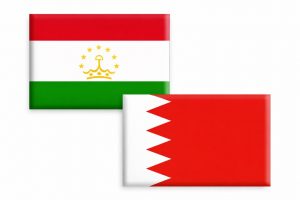 Joint Statement by the Ministries of Foreign Affairs of the Republic of Tajikistan and the Kingdom of Bahrain on the Occasion of the 30th Anniversary of the Establishment of Diplomatic Relations
Joint Statement by the Ministries of Foreign Affairs of the Republic of Tajikistan and the Kingdom of Bahrain on the Occasion of the 30th Anniversary of the Establishment of Diplomatic Relations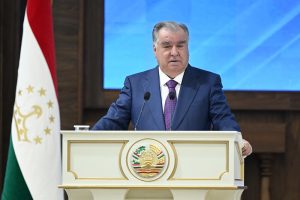 The Political School of the Leader of the Nation in the Context of the Activities of the People’s Democratic Party of Tajikistan
The Political School of the Leader of the Nation in the Context of the Activities of the People’s Democratic Party of Tajikistan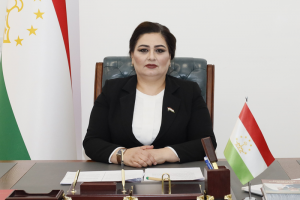 Modern Parliamentarism and the Role of the Asian Forum of Parliamentarians on Population and Development: From Experience Sharing to Practice-Oriented Policy Worldwide
Modern Parliamentarism and the Role of the Asian Forum of Parliamentarians on Population and Development: From Experience Sharing to Practice-Oriented Policy Worldwide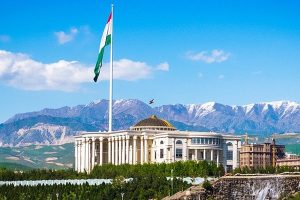 TAJIKISTAN — A LAND OF GLACIERS AND GLOBAL INITIATIVES. The Dushanbe Conference Marks a New Era in Glaciers’ Preservation
TAJIKISTAN — A LAND OF GLACIERS AND GLOBAL INITIATIVES. The Dushanbe Conference Marks a New Era in Glaciers’ Preservation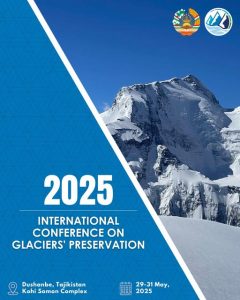 High-Level International Conference on Glacier Preservation to Serve as Global Platform for Resource Mobilization
High-Level International Conference on Glacier Preservation to Serve as Global Platform for Resource Mobilization Belt and Road Initiative Bridges Nations, Cultures, and Futures Through Media and Communication
Belt and Road Initiative Bridges Nations, Cultures, and Futures Through Media and Communication ROGUN — A MASTERPIECE OF NEW ENERGY AND CLEAN TECHNOLOGIES. This Greatest Facility Will Lead Tajikistan to Complete Energy Independence
ROGUN — A MASTERPIECE OF NEW ENERGY AND CLEAN TECHNOLOGIES. This Greatest Facility Will Lead Tajikistan to Complete Energy Independence Majestic and Tourist Site of Dushanbe Istiklol Square Wins the Hearts of Capital’s Residents and Guests
Majestic and Tourist Site of Dushanbe Istiklol Square Wins the Hearts of Capital’s Residents and Guests Sheep of the Hissor Breed Are Originally Tajik and Considered the Largest in the World
Sheep of the Hissor Breed Are Originally Tajik and Considered the Largest in the World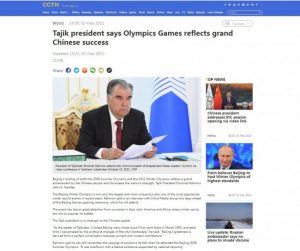 President of Tajikistan Emomali Rahmon Answers Questions of Chinese Official Media on the Eve of the Winter Olympic Games
President of Tajikistan Emomali Rahmon Answers Questions of Chinese Official Media on the Eve of the Winter Olympic Games The Voice of the President of Tajikistan. The World Has Heard It and Should Collectively Support It!
The Voice of the President of Tajikistan. The World Has Heard It and Should Collectively Support It!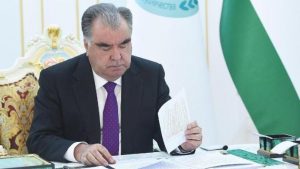 TWENTY YEARS OF THE SCO: COOPERATION FOR STABILITY AND PROSPERITY. Article by the President of Tajikistan, Chairman of the Council of Heads of SCO Member States in 2021 Emomali Rahmon
TWENTY YEARS OF THE SCO: COOPERATION FOR STABILITY AND PROSPERITY. Article by the President of Tajikistan, Chairman of the Council of Heads of SCO Member States in 2021 Emomali Rahmon














